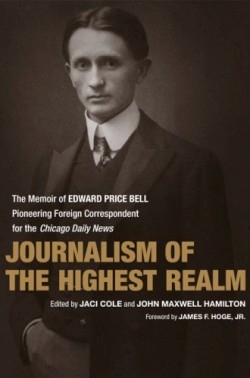Journalism of the Highest Realm
The Memoir of Edward Price Bell, Pioneering Foreign Correspondent for the Chicago Daily News
“I do not control or bend the national destiny; it controls and bends me,” Benito Mussolini told Edward Price Bell in an interview in 1924. Bell was the Chicago Daily News’ first foreign correspondent and the paper sent him to London in 1900 where he covered Word War I *’*and the fight for American neutrality in 1939 at the start of World War II.
Bell (1869-1943) began his career at a small paper in Terre Haute, Indiana, and spent more than two decades in London writing background and analysis of current events. Bell describes his first office in London—just the requisite size for his roll-top desk that held a typewriter. “But it delighted me,” he writes. “It was a little world where I could be alone and look out upon a big world.” After his return to Chicago in the mid-1920s, the paper sent him on special missions to Europe and Asia to interview leaders regarding world peace.
He also appealed to United States Secretary of State Cordell Hull, Herbert Hoover, and a score of U.S. senators and representatives, along with numerous Americans distinguished in religion, scholarship, literature, business, and journalism. Bell’s stories were published in two books and earned him a nomination for the Nobel Peace Prize in the 1930s.
—James F. Hoge, Jr., editor of Foreign Affairs, writes in the book’s foreword that after World War II the Daily News steadily reduced the number of overseas correspondents and that by 1978—thirty-five years after Bell’s death—the paper went out of business. Hoge posits that the pressures that killed the Daily News have steadily grown to affect all established media, not just afternoon papers.
Editors Cole and Hamilton rescued Bell’s memoir from the archives of Chicago’s Newberry Library, and list numerous sources for the history of the Daily News as well as the sources used in assembling the extensive footnotes.
Cole is a graduate student at LSU’s Manship School of Mass Communication, while Hamilton is an NPR commentator and author of five books.
Their book brings to life a newspaperman and his era, a world of journals and journalism all but forgotten.
Disclosure: This article is not an endorsement, but a review. The publisher of this book provided free copies of the book to have their book reviewed by a professional reviewer. No fee was paid by the publisher for this review. Foreword Reviews only recommends books that we love. Foreword Magazine, Inc. is disclosing this in accordance with the Federal Trade Commission’s 16 CFR, Part 255.

